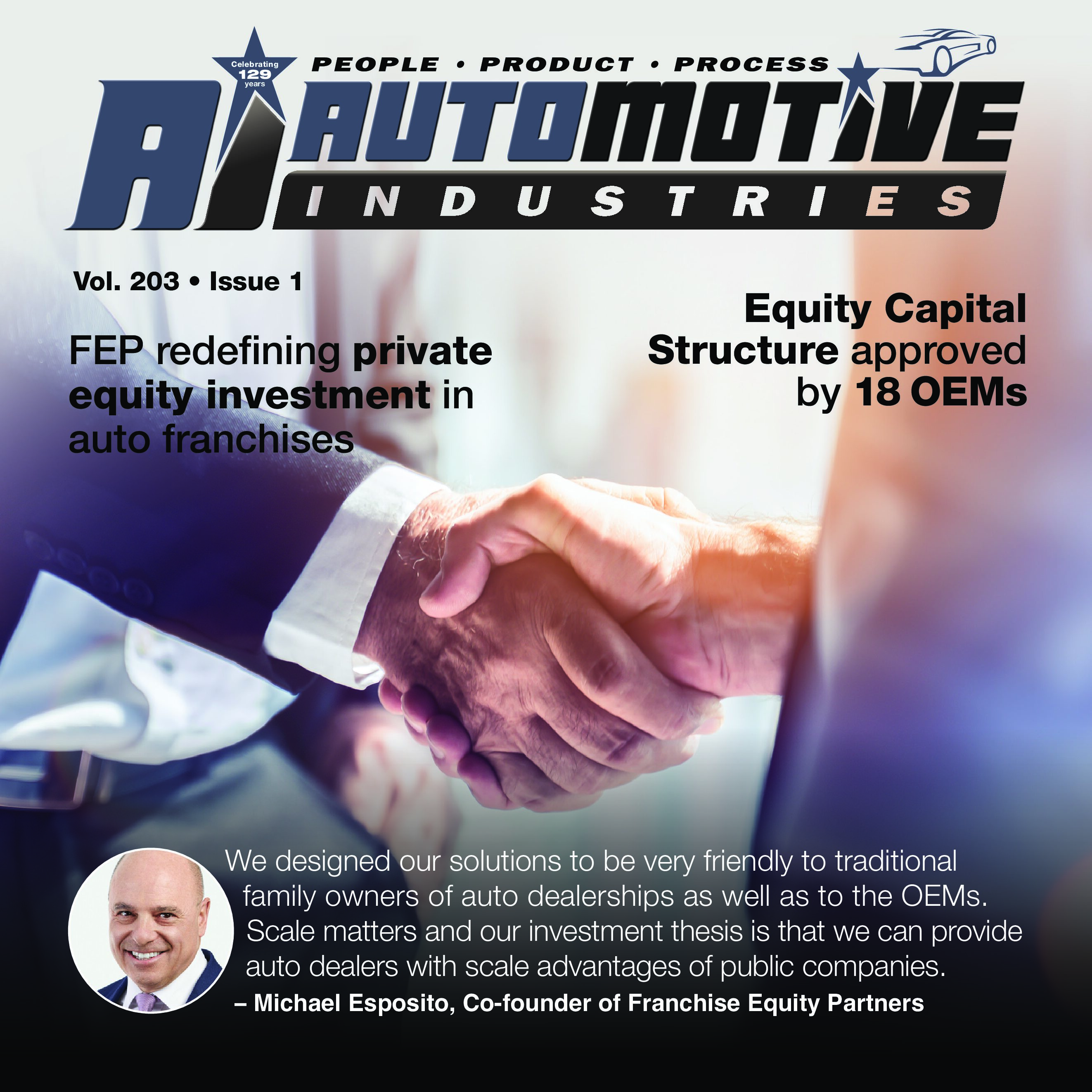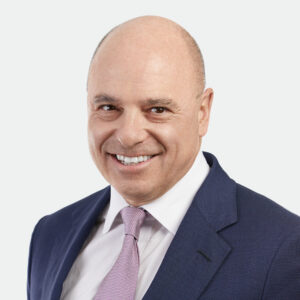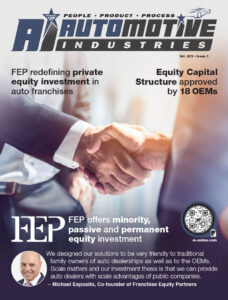
In an ever-evolving automotive landscape, the role of private equity in sustaining and elevating the fortunes of auto dealerships is undergoing a transformative shift.
Franchise Equity Partners (FEP), under the leadership of Mark LaNeve, is redefining private equity in the automotive industry with its minority, permanent, and passive investment approach.
This strategy is designed to empower automotive franchisees, providing them with crucial tools to navigate the complexities of the market, lending challenges, and uncertainties.
FEP’s approach encapsulates three primary use cases, each tailored to address the nuanced needs of automotive dealers. Whether it is facilitating diversification, orchestrating buyouts, or enabling significant acquisitions, FEP offers a flexible and supportive investment model.
The unique aspect lies in being minority, passive, and permanent, attributes that have already garnered approval from 18 Original Equipment Manufacturer (OEM) brands. In an industry where long-term relationships with OEM brands are paramount, FEP stands out by aligning its capital structure with the desires of both dealers and manufacturers.
Despite private equity investments in the automotive sector being in decline since Q2 2022, FEP envisions opportunities for automotive franchisees to leverage the firm’s distinct approach.
Automotive Industries (AI) asked Mark LaNeve, Chairman of the Automotive Unit at FEP, to elaborate on the minority, permanent, and passive investment approach.
LaNeve: We have three primary use cases:
- Dealer seeks a minority position to monetize (take some chips off) for diversification or redeployment of the capital.
- FEP buys out a partner, investor or family member who is seeking to exit the business.
- FEP provides capital for a significant acquisition and respreads the investment across the entire platform to return to a minority (sub 50%) position. In this use case the dealer in effect uses our capital in lieu of debt.
AI: With PE investments in the automotive industry declining since Q2 2022, what opportunities does FEP see in the sector?

LaNeve: There is currently (and historically) little private equity activity in the dealer franchise world. This is mainly because the OEM brands are interested in having long-term owner operators who they know and with whom they have a relationship.
FEP is different from traditional PE in that our capital is minority, passive and permanent.
Because of this we have already been approved as a minority owner by 18 OEM brands.
AI: FEP plans to invest around US$1 billion in minority stakes in auto dealerships over the next three years. What criteria does the firm use to identify potential investments?
LaNeve: We seek to partner with best-in-class dealer operators who are growth oriented. It is our intention to have 6-10 platforms dispersed geographically in the key US auto markets.
AI: How many platforms do you have?
LaNeve: We currently have two. One in the Northeast US (NY, NJ, CT, PA) and one in the Carolinas. Our philosophy does not have multiple investments in the same geography as we do not want our partners to be competing with each other for customers or acquisitions
We align via a simple operating agreement and frequent data share and communication with our partners. We provide back-end support when requested by our partners such as data or corporate finance but do not seek to interfere with their operating the business.
AI: Considering your involvement with both FEP and Charge Enterprises, which provides expertise and services for places that want to install charging stations, how do you manage your time between these roles?
LaNeve: I spend adequate time with FEP and travel frequently to meet potential partners. As a second career it is perfect as it keeps me in touch with dealers, which has always been my passion. I can work remotely from both Michigan and Florida.
AI asked Michael Esposito, Co-founder of FEP, what led the firm to adopt its investment approach, and how this differentiates it from traditional private equity models.
Esposito: We designed our solutions to be very friendly to traditional family owners of auto dealerships as well as to the factories.
Private equity typically has three flaws:
- One, they leverage businesses significantly.
-

Michael Esposito, Co-founder of FEP. Two, they replace long time owners.
- Three, they sell the business after five to six years.
Our approach is radically different. We believe that the best value can be created by our minority, passive, and permanent approach.
We take minority stakes owning less than 50% and typically between 20-40%. We are passive in that all day-to-day decisions rest with the owner operators as they have more skin in the game than us.
Finally, we are permanent so that we have no ability once the money goes in to force a sale of the business or have the dealer buy back our stake.
AI: Why auto dealerships?
Esposito: We think auto dealers are a fantastic place to invest money. They are very stable, even in recessionary times, due to the high contribution from parts and service business.
The best dealerships are growing via acquisitions. With that said, we think that scale matters and our investment thesis is that we can provide auto dealers with scale advantages of public companies.
What do we mean by that?
We can provide synergies in addition to just our capital. We can become the outsourced corporate finance partner in helping with mergers and acquisitions (M&A) and extracting the best terms in the financing markets.
We see a lot of flow in terms of M&A through different channels, and finally over time we expect that we will be able to add value by extracting the best terms in vendor contracts, such as dealer management systems.

AI: A partnership with HPS Investment Partners involves a significant allocation of funds, with a focus on auto dealerships, restaurants, heavy-equipment dealerships, and more. How does this strategic partnership enhance the capabilities of FEP in supporting businesses within these sectors?
Esposito: HPS Investment Partners is a very large asset management company based in New York with $110 billion of assets under management. Their firepower allows us to write larger checks and provide more creative solutions when need be.
AI: Please share some insights into the criteria FEP considers when selecting potential dealership investments, and what factors contribute to a successful partnership?

Esposito: First and foremost, we want to partner with best-in-class dealer operators. We are not operators and therefore we do not want to buy troubled situations.
We do like it when our partners can buy troubled assets, but we do not want to do that directly. In addition, we are very open-minded to a variety of dealers. Currently we have dealer groups in the Northeast and in the Carolinas.
Ideally, we would like to diversify geographically, and we have broad ownership of 18 different brands, and would like to continue that great diversity of ownership.
AI: How do you strike a balance between providing passive capital and ensuring effective collaboration with the dealerships for mutual success?
Esposito: We have found over time that while we remain passive, our best investments involve two-way mutual engagement. While we will never be able to tell a dealer how to price used inventory, or how to compensate their sales team, we think we have a variety of complementary skills.
Our operating partners bring deep experience in the auto industry and a broad set of relationships with OEMs and other players in the auto ecosystem within auto. Our investing team has M&A experience and capital markets expertise, typically with banks, so that we feel like we can add a lot of value beyond just our capital.
AI: With the completion of an investment in the Taco Bell fast-food chain and plans for an auto dealership investment, can you discuss the overall strategy behind diversifying investments across different sectors and how this aligns with FEP’ long-term goals?
Esposito: Our goal is to establish a diversified portfolio across our five investment verticals: auto dealers, restaurants, heavy equipment dealers, beverage distributors, and other consumer and business services.
These investments benefit from the fact that these industries are recession resistant, affiliated with iconic brands, and have high cash on cash returns, and experience ongoing consolidation. We believe that this allows us to partner with best-in-class family business across our verticals and produce great risk adjusted returns.
AI asked Don Reese, Former CEO of pre-owned car retailer DriveTime, how his experience supports FEP.
Reese: The majority of my background (30 of 35 years) has been in Franchise Auto Retail. My experience has been largely on the operational side, and I have led numerous M&A auto deals.

My industry relationships and experience and commitment to the industry with innovation, growth, development and consolidation, combined with our firm’s unique position gives me great confidence in FEP’’s ability to execute our strategic partnership plan well into the future
AI: FEP aims to invest around $1 bn in auto dealerships over the next three years. How does this investment strategy align with the current trends and challenges in the automotive retail industry?
Reese: We believe the industry is going through and is headed further into consolidation. The dealerships and family enterprise values have increased dramatically post pandemic. There is very little institutional equity capital in this sector.
The fact that we are a minority, passive and permanent capital appeals to OEMs and legacy family businesses that want to continue with next generation succession and scale their operations.
AI: You mentioned that FEP wants dealers to maintain control of their dealerships. How do you envision this approach fostering collaboration between FEP and the dealership owners?
Reese: We have and intend to continue to invest in quality operating partners. They have a combination of great entrepreneurial talents and data driven decision-making capabilities with investments in talent and technology.
Our corporate finance skill set, and automotive experience combined with their operational excellence is the most ideal combination of talents.
AI: In the context of the automotive industry challenges, including the impact of the global pandemic and raw material shortages, how does FEP provide support to auto franchisees?
Reese: Our auto team has over many years navigated both the most difficult and opportunistic industry business cycles. We do extensive work with business intelligence and data science with modeling around all of these cycles. We provide at their request support in leadership and in consultation with our operating partners around execution of strategies to best perform with these respective cyclical trends.
AI: What advantages does your investment approach offer franchisees, especially in terms of addressing lending issues that they might encounter through more traditional financing methods?
Reese: The minority, passive and permanent investor structure appeals to our franchise operating partners. It offers growth capital to fund larger size multi franchise acquisitions and promote brand and location diversification and scale opportunities for dealers.
It also supports family succession opportunities and organizational growth for career opportunities for the long-term talented teams of legacy family businesses.
AI: Looking ahead, how do you see the role of private equity evolving in the automotive industry?
Reese: Our role as a unique equity capital partner functions more like a family office.

Our structure, as opposed to “control” oriented private equity firms or public companies, is to support and retain great legacy automotive retail regional dealer brand names to continue to grow and prosper in communities that they have supported for many years.
We see significant opportunities ahead with dealers. The OEMs, vendors, banks, and their professional partners who have supported them for years like our structure and people, as we continue to work and collaborate together to expand our individual and collective interests.
Multi-faceted team and approach
FEP, under the leadership of Mark LaNeve, is redefining private equity in the automotive industry with its minority, permanent, and passive investment approach. This innovative strategy, backed by OEM brand approval and a US$1 bn investment plan, positions FEP as a key player in navigating market challenges.
The firm’s focus on best-in-class dealer operators, geographic diversity, and a hands-off operating approach distinguishes it from traditional private equity models. The emphasis on collaboration, complementing skills, and allowing dealers to maintain control underscores a commitment to mutual success.
As FEP extends its investment reach to sectors like fast food and auto dealerships, the strategy to diversify across different verticals is evident. The firm’s vision of a diversified portfolio, recession-resistant industries, and ongoing consolidation aligns with its goal of producing risk-adjusted returns.
Michael Esposito, Co-founder of FEP, provides insights into the firm’s unique investment model, highlighting its appeal to family-owned dealerships and OEM brands. His vision of establishing a diversified portfolio across various verticals reflects a commitment to creating value and fostering growth for best-in-class family businesses.
Don Reese, with extensive experience as the former CEO of DriveTime, adds industry-specific insights. His perspective on industry consolidation, increasing dealership values, and the appeal of FEP’s minority, passive, and permanent capital resonates with the evolving dynamics of the automotive retail sector.
Looking ahead, FEP envisions a role akin to a family office, supporting legacy automotive retail businesses for sustained growth. The firm anticipates significant opportunities in collaboration with dealers, OEM brands, vendors, banks, and professional partners as they collectively navigate the evolving landscape of the automotive industry.


More Stories
Acoustic sensor systems and Fraunhofer measurement technology for in practical testing ͏
OSI Systems Receives $10 Million Order for Cargo and Vehicle Inspection Systems
Mitsubishi Electric Automotive America Launches Guardian Generation 3 Trial with Seeing Machines in North America